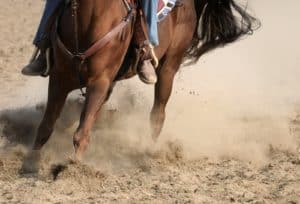
Antimicrobial Resistance in Equine Practice: An Overview of the Problem
One expert calls antimicrobial resistance a threat to global horse health. Here’s how equine vets can improve diagnostics and use antibiotics wisely to combat this crisis.


One expert calls antimicrobial resistance a threat to global horse health. Here’s how equine vets can improve diagnostics and use antibiotics wisely to combat this crisis.

Find out which horses and ponies have a higher genetic risk for EMS and how to manage them.

An equine veterinarian describes why uneven pressure on the hoof can cause quarter cracks and how farriers can manage them using corrective trimming and shoeing.

Learn about common joint issues that concern horse owners and what preventive and therapeutic approaches are available. Read more in the Spring 2025 issue of The Horse.

Osteoarthritis might not be completely avoidable as a horse ages, but early diagnosis and conscientious care can slow its advance and minimize pain.

Experts describe the 3 most common problems associated with equine hock lameness and how veterinarians can make an accurate diagnosis in these complex joints.

Experts described 6 new studies that made significant impacts on equine musculoskeletal problem diagnosis and treatment in 2024.

Researchers believe PPID (formerly called equine Cushing’s disease) might have negative effects on mare fertility but need more research to understand why.

Milne lecturer Dr. Lisa Fortier advises veterinarians to evaluate a horse’s overall health before using orthobiologics and to treat injuries early for the best outcomes.

A modified borescope might be a more accessible way for equine veterinarians to perform endoscopic exams in working donkeys.

Researchers discovered that a significant percentage of cart donkeys might have reduced tracheal function, while pack donkeys do not.

Learn about new applications for biologic therapies to treat horses’ infertility, wounds, ligament injuries, and eye issues.

Early diagnosis and proper treatment of these joint problems can make the difference in whether the horse can return to soundness.

Two experts describe this degenerative suspensory ligament condition in horses and what new information researchers are learning about it.

An equine nutritionist emphasizes the importance of fiber in horse diets and shares 2 rules for safe fiber-feeding practices.

Here’s how you can recognize the early signs and risk factors for EGUS, and how veterinarians diagnose and treat the condition.
Stay on top of the most recent Horse Health news with